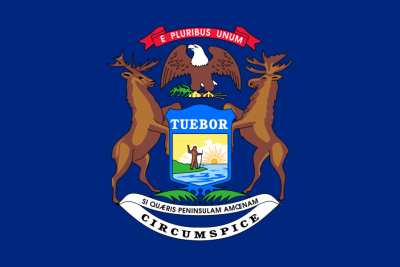Michigan

Michigan recognizes both a right of publicity and the tort of invasion of privacy by appropriation. The Sixth Circuit Court of Appeals has held that the right of publicity is descendible under Michigan law.
Statute
NO
Common Law - Right of Publicity
YES
Federal courts have held that the state would recognize a right of publicity. At least one state appellate court has agreed with this characterization.
It is not clear whether the appropriation tort is synonymous with the right of publicity. Federal courts have suggested that it is. Rosa and Raymond Parks Institute for Self-Development v. Target Corp., No. 15-10880 (11th Cir., Jan. 4, 2016); Ruffin-Steinback v. dePasse, 267 F.3d 457 (6th Cir. 2001); Hauf v. Life Extension Foundation, 547 F.Supp.2d 771, 774-75 (W.D. Mich. 2008).
Rosa and Raymond Parks Institute for Self-Development v. Target Corp., No. 15-10880 (11th Cir., Jan. 4, 2016)
Carson v. Here’s Johnny Portable Toilets, Inc., 698 F.2d 831 (6th Cir. 1983)
Arnold v. Treadwell, 2009 WL 2136909 (Mich. Ct. App., July 16, 2009)
Common Law - Right of Privacy-Appropriation Tort
YES
The state recognizes both a right to privacy and the appropriation branch of that tort. The state Supreme Court, however, has held that public figures who have sought the limelight cannot make a claim under a right to privacy rubric.
Pallas v. Crowley-Milner & Co., 54 N.W.2d 595 (Mich. 1952)
Beaumont v. Brown, 257 N.W.2d 522 (Mich. 1977)
Post-Mortem Right
LIKELY YES
Federal courts have recognized that the right of publicity is descendible. No state court has ruled on the question.
At least one state court has approved of the federal courts’ interpretation of Michigan law generally, and described the right of publicity in terms of a property right, distinct from the state’s right of privacy. Arnold v. Treadwell, 2009 WL 2136909 (Mich. Ct. App., July 16, 2009). This suggests that Michigan courts might find the right to be descendible at common law. Something that a recent district court in Minnesota held with regard to that state’s common law in Paisley Park Enters v. Boxill, 253 F. Supp.3d 1037.
Rosa and Raymond Parks Institute for Self-Development v. Target Corp., No. 15-10880 (11th Cir., Jan. 4, 2016)
Herman Miller, Inc. v. Palazzetti Imports and Exports, Inc., 270 F.3d 298 (6th Cir. 2001)
Limits on Right
Does the law require the plaintiff or identity-holder to be a celebrity or have a commercially valuable identity?
YES
Federal courts have recognized that the right of publicity, and potentially the tort of appropriation, require a commercially valuable persona to have been used.
Hauf v. Life Extension Foundation, 547 F.Supp.2d 771 (W.D. Mich. 2008)
Does the law protect persona?
LIKELY YES
Federal courts have extended Michigan’s right of publicity to include recognizable catch phrases. Several courts, however, have rejected claims based on appropriation of voice, at least where the singer(s) were not distinctive.
Carson v. Here’s Johnny Portable Toilets, Inc., 698 F.2d 831 (6th Cir. 1983)
Romantics v. Activision Pub., Inc., 574 F.Supp.2d 758 (E.D. Mich. 2008)
Edwards v. Church of God in Christ, 2002 WL 393577 (Mich. Ct. App. March 8, 2002)
Is Liability Limited to Uses on Commercial Advertising or Commercial Speech?
No court in Michigan has so limited the right, but one federal district court suggested that publicity claims may be limited to uses in commercial speech. Several state and federal courts have suggested a broader framework that only requires some sort of “commercial exploitation” by a defendant. The Sixth Circuit has considered a right of publicity claim in the context of a song title
The decision in Nichols v. Moore could also be based on the public interest in knowing about the brother of the Oklahoma City bomber without regard to commerciality. The decision does, however, at the very least suggest that commercial speech and noncommercial speech may be treated differently when considering First Amendment and First Amendment-infused defenses to right of publicity claims. Some state courts also have cited to the Restatement (Second) of Torts approach which only requires a use to the defendant’s advantage without regard to commerciality.
Parks v. LaFace Records, 329 F.3d 437 (6th Cir. 2003)
Nichols v. Moore, 334 F. Supp.2d 944 (E.D. Mich. 2004)
Battaglieri v. Mackinac Center for Public Policy, 680 N.W.2d 915 (Mich. Ct. App. 2004)
First Amendment Analysis
Michigan courts have held that the First Amendment protects the use of a person’s name or likeness when the use is newsworthy or otherwise a matter of “legitimate public concern.” Michigan sits within the Sixth Circuit Court of Appeals, which has applied the “Rogers/relatedness/Restatement Test” to evaluate First Amendment defenses in the context of the right of publicity, as well as employing a balancing approach and the transformativeness test.
Under the Rogers/Restatement test, the use of a person’s identity in an expressive work is protected by the First Amendment unless the use is “wholly unrelated” to the work or is “simply a disguised commercial advertisement for the sale of goods or services.” In ETW Corp. v. Jireh Publishing, the Sixth Circuit cited this test with approval, but also considered the Tenth Circuit’s balancing approach and California’s transformative use test.
Battaglieri v. Mackinac Center for Public Policy, 680 N.W.2d 915 (Mich. Ct. App. 2004)
Parks v. LaFace Records, 329 F.3d 437 (6th Cir. 2003) (applying Michigan publicity law)
ETW Corp. v. Jireh Pub., Inc., 332 F.3d 915 (6th Cir. 2003) (applying Ohio publicity law)
Ruffin-Steinback v. dePasse, 267 F.3d 457 (6th Cir. 2001)
Other Commentary
- Michigan courts have treated the right to one’s name or likeness as a “property right.”
Battaglieri v. Mackinac Center for Public Policy, 680 N.W.2d 915 (Mich. Ct. App. 2004) - Federal courts have held some right of publicity claims under Michigan law preempted by federal copyright law.
Armstrong v. Eagle Rock Entertainment, Inc., 655 F.Supp.2d 779 (E.D. Mich. 2009)
